|
|
|
 |
|
"MY BELOVED IS UNTO ME
AS A CLUSTER OF
HENNA IN THE VINEYARDS OF EN GEDI"
SONG OF SONGS 1
|
|
|
 |
|
 |
| |
Cleopatra, who
became Queen of Egypt in 51 B.C., at the age of 19,
was actually not Egyptian. She was from
Macedonia, a region in the north of Greece.
She was descended from Ptolemy, a general of
Alexander the Great who became King of Egypt after
Alexander’s death in 323 B.C. Ptolemy founded
a dynasty, but by the time Cleopatra ascended the
throne, the Ptolemies’ strength was falling and the
Roman Empire was rising. Tribute had to be
paid to the Romans to keep them away from Egypt.
A gifted linguist, Cleopatra spoke at least eight
languages, according to Plutarch,
end of the first century A.D. Roman biographer, who
was not one of her admirers.
He wrote that besides her native Greek, she spoke
the language of the Ethiopians, the Hebrews,
Troglodytes (cave-dwellers!), Arabians, Syrians,
Medes, and the Parthians. Plutarch noted that
most of her royal predecessors scarcely went to the
trouble to acquire the Egyptian tongue.
“It was a pleasure merely to hear the sound of her
voice, with which, like an instrument of many
strings, she could pass from one language to
another,” wrote Plutarch.
But Plutarch went on to proclaim that Cleopatra was
not a striking beauty. (If you don’t believe
it, look at her image on a silver coin issued in
Ashkelon,
property of the British Museum.) Nevertheless,
her physical presence was magnetic, her conversation
charming, her character bewitching and her ambition
contagious. |
| |
|
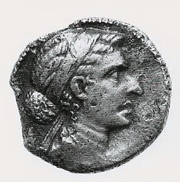 |
Egyptians viewed her as Iris, the great mother
goddess and the Greeks saw her as Aphrodite, the
goddess of beauty. For the protection of her
skin against the hot dry desert winds and the
scorching Egyptian sun, she used oils and Judean
balsam. She delighted in exotic perfumes and
on every voyage the sails of her ship were coated
with precious oils so that the “winds were lovesick
with them.”
In compliance with Egyptian tradition, Cleopatra
married her brother and co-ruler, Ptolemy XIII, who
was about |
|
British Museum
Collection |
16 at the time. But it was a marriage of
convenience |
|
only, and Ptolemy was
pharaoh in name only. For three years he
remained in the background, while Cleopatra ruled
alone. |
| |
By 48 B.C. Cleopatra had so alarmed court officials
in Alexandria by her independence, that they
conspired to overthrow her in favor of her more
pliable younger brother Ptolemy XIII.
Cleopatra was forced to flee Alexandria and go into
exile in Syria. Determined to regain her throne, she
began to amass an army on Egypt’s border, making
Ashkelon,
formerly a Philistine city on the Mediterranean
coast of Judea,
25 miles south of Jaffa, her temporary base. |
| |
|
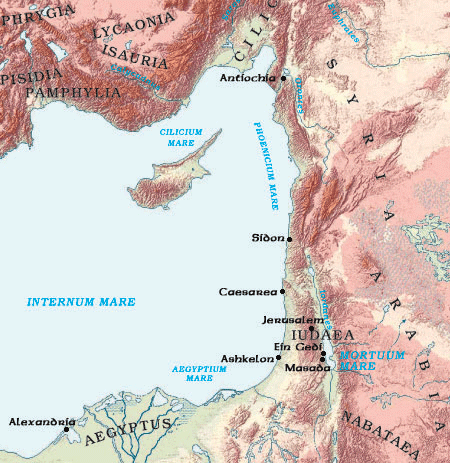 |
|
This map originated
on http://iam.classics.unc.edu |
|
Copyright 1998.
Interactive Ancient Mediterranean |
|
Roman Empire in the Eastern
Mediterranean |
| |
Meanwhile in Rome,
there was a civil war between Julius Caesar and
Pompey over who was to rule the Empire. Pompey
was defeated and headed to Alexandria, hoping to
find refuge with Ptolemy XIII, of whom he was a
senate-appointed guardian. Pompey was murdered (and
beheaded) as he stepped ashore in Alexandria.
Four days after the death of Pompey, Julius Caesar
landed in Egypt and summoned Cleopatra and her
brother Ptolemy XIII.
Wary of being captured by her brother’s henchmen,
Cleopatra set sail at night in a little boat with
only one of her trusted friends, slid through the
harbor undetected and landed near the palace in
Alexandria. She was smuggled ashore in an
oriental carpet tied round with a leather thong and
carried on the back of her friend Apollodorus right
into Caesar’s palace.
Plutarch reported that when the carpet unrolled and
Cleopatra fell out, Caesar fell in love with her
then and there. He was 53. She was 22.
Instead of annexing Egypt to Rome, Caesar set
Cleopatra back on the throne along with her younger
half-brother, Ptolemy XIV, who was 12 years
old. (Her former co-regent Ptolemy XIII had
drowned in the Nile while trying to flee.)
Later Cleopatra and her co-ruler-half brother made a
red-carpet visit to Rome. Julius Caesar hosted
them in one of his own palaces. She was still
in Rome on the Ides of March 44 B.C. when Caesar was
assassinated. Horrified, she quickly departed
for home. |
| |
| |
Marc Antony,
Caesar’s heroic charismatic general, had
expected to be named in Caesar’s will, but
instead, Caesar’s teenaged grand-nephew,
Octavian was named beneficiary. (Many
Rome guides claim that Octavian forged the
will!) Octavian and Antony joined together
in Rome to defeat Caesar’s enemies.
Then they agreed to divide the Roman world.
Octavian took the west and Antony the east.
Now we get to the famous love saga of Antony
and Cleopatra.
When Antony sailed for the East, in 37 B.C.,
he summoned Cleopatra, who came to him in
Antioch, Syria. Antony was smitten
with her. (They say, “He came, he saw,
SHE conquered!”) Antony gave Cleopatra
gifts of land in Phoenicia, Syria, Cyprus,
Sicily, a coastal strip of Arabia all the
way down to the Red Sea – and the “side of
Judea that produced balsam.” Cleopatra
wanted more. She felt that as a
Ptolemy, she deserved all of Judea, which
had once belonged to her ancestors.
Cleopatra dominated Antony, but he would not
take the entire territory away from Herod,
his loyal friend, and transfer it to
Cleopatra. Instead, Antony gave her
smaller portions, including Herod’s royal
date and balsam plantations in
Jericho
and En Gedi.
|
| |
|
 |
|
Photo:
Gila Yudkin |
|
In Cleopatra’s day,
Jericho was famed for its balsam |
| |
| Herod was so
appalled at having the ambitious Cleopatra
so close to Jerusalem, the capital of his
kingdom, that he leased back the territories
from Cleopatra and paid her a very generous
fee. Just to be on the safe side,
south of En Gedi, he built the desert
fortress of Masada
which overlooked the spice route leading to
Arabia. In the words of first century
A.D. Jewish-Roman historian Josephus
Flavius, |
| |
“It is said that Herod equipped this
fortress as a refuge for himself,
suspecting a double danger: peril on the
one hand from the Jewish people, who might
dethrone him and restore to power their
former dynasty and the greater and more
serious danger from Cleopatra,
Queen of Egypt. (Wars, Book VII, Chapter
VIII, 4)
|
|
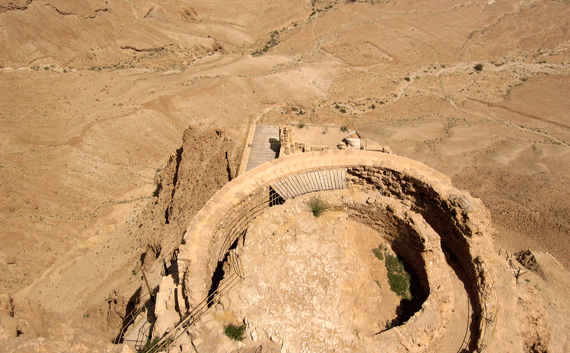 |
|
Photo:
Gila Yudkin |
|
View of the Judean desert
below the middle tier of Masada's northern palace |
| |
Cleopatra,
on her part, tried to seduce Herod and made
no secret of it. Josephus suggested
that perhaps she had a passion for him – but
more likely, she intended to lay a
treacherous snare for him. Herod
seriously considered killing her, but his
advisors dissuaded him. Antony would
be furious, they declared. Herod
evaded her overtures, treated her
courteously, lavished gifts on her and
escorted her to the Egyptian border.
As he waved good-bye to her, he probably
said, “Shalom Al Yisrael.” (It
literally means “peace on Israel,” but today
we use it to mean, “Good-bye and good
riddance.”) (See
Hebrew for Pilgrims if you’d like to
learn some other handy phrases.)
Cleopatra’s downfall was Antony’s
overwhelming desire to be with her.
Antony hastily went to war in the east too
early in the season. As he hurried his
army along, he made a catastrophic mistake.
His siege equipment – huge battering rams
which broke down city walls, which was
carried in 300 carts – was forgotten and
left behind!!! It was then captured by
his enemy and burned. His troops
suffered from famine or were poisoned by the
herbs they ate and the water they drank.
Antony lost about 24,000 men.
Cleopatra set sail to meet Antony by Sidon,
on the Phoenician coast. Plutarch
colorfully described Antony’s frenzied
drinking and constant rushing to the coast
to see if her ships were in sight.
When Cleopatra arrived, she brought clothing
for the soldiers, money to pay them and
cedars of Lebanon which he needed for
ship-building at which the Egyptians were
greatly skilled. |
| |
However, instead of attacking Parthia in the
East, Antony returned to Alexandria with
Cleopatra. When it was discovered in
Rome that Antony had willed Cleopatra, the
Queen of Egypt, all the eastern Roman
Empire, should he die, Rome cancelled all
Antony’s power, reduced him to the rank of a
private citizen and declared war on both him
and Cleopatra.
When the Roman fleets met at Actium (31
B.C.) on the eastern coast of Greece, Antony
was soundly defeated. He and Cleopatra
sailed for Egypt. She saw the battle
was over and believed they lived to fight
again. Cleopatra was only 39 years
old. But Antony was a broken man.
Up on the hills overlooking the harbor of
Alexandria, Antony watched as Octavian’s
ships entered. Thinking that he had
been betrayed by Cleopatra, Antony fell on
his sword and was mortally wounded. He
was taken to Cleopatra and died in her arms.
His last words – according to Shakespeare –
were, “I am dying Egypt, dying…one word
sweet Queen -- of Caesar seek your honor and
your safety.” Shakespeare has
Cleopatra reply, “They (honor and safety) do
not go together.”
When Octavian (who had assumed the title,
"Caesar" which became synonymous with
emperor) entered Alexandria, there was
no resistance. Octavian tried to
prevent Cleopatra’s suicide. He
probably intended to have her dragged
through the streets of Rome in gold chains.
But Cleopatra had other plans.
After visiting Antony’s tomb and her own,
she dressed herself, as if for dinner.
A countryman came to her with a basket of
figs and an asp whose bite had the power to
kill quickly. It’s said that she died
with the dignity with which she had lived –
on a gold bed in her regal robes. |
| |
|
Postscript on evidence of Cleopatra's
possible (probable?) visit to Jericho |
|
|
|
A bronze cart fitting in the shape of a
striking cobra was found in Jericho during
an archeological expedition directed by
Ehud Netzer from
1973 to 1987. The cobra, ready to
strike, was the royal symbol of Cleopatra.
It was found buried in earthquake debris of
31 BC in a ritual bath west of the Hasmonean
Palace complex.
This bronze cart fitting had once graced
a carriage, more than likely, one of
Cleopatra's entourage as she visited
Jericho, inspecting its balsam and date
plantations. (Thanks to Dr. Guy
Stiebel who studied and analyzed this
artifact. published by the Israel
Exploration Society in 2013.) |
|
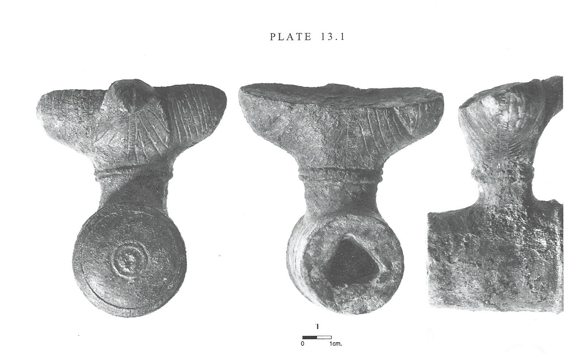 |
| |
|
Photos
courtesy of the Israel Exploration Society
"Hasmonean and Herodion Palaces at Jericho",
2013 |
|
Bronze cart fitting shaped
like a striking cobra found in earthquake
debris of 31 BC |
| |
Postscript
on Herod
To the end, Herod had stubbornly remained
loyal to Marc Antony. He never forgot
that it was Antony, a decade earlier, who
had lobbied the Roman Senate to appoint him
"king" of Judea. After the defeat and
double-suicide of Antony and Cleopatra,
Herod was in deep, deep trouble. Everyone expected that
Octavian would avenge all support rendered
to his arch enemies Antony and Cleopatra.
By all accounts, Herod made a bold move.
Dressed as a commoner, but with the proud
bearing of a king, Herod appeared in Rhodes
before Octavian. Josephus respectfully
quoted his speech, |
| |
“Caesar, it was Antony who made me king
and I admit that I rendered to him every
possible service. I will not
hesitate to say that if I had not been
detained by the Arabs, you certainly would
have found me fighting by his side.
As it was, I sent him all the auxiliary
troops I could and many thousands of
measures of grain.
I did not desert my benefactor, even after
his defeat at Actium. However, when I
could no longer be useful as an ally, I
gave him the best possible advice:
Kill Cleopatra. I promised him
money, a protecting wall, an army and my
active participation in the war against
you.
However, his ears remained deaf through
his passion for Cleopatra. God has
granted you victory. I am defeated
with Antony and with him, I lay down my
crown. I have come to you, basing my
hope of safety upon my integrity. I
hope you will ask yourself, not whose
friend, but how loyal a friend I have
been.” (Wars, Book I, Chapter XX, 1)
|
| I imagine
there was silence and bated breath for some
moments. Finally, Octavian proclaimed
that he admired Herod’s bold spirit and
advised him, “Next time, pick the winning
side!” |
| |
| To show his
undying gratitude, Herod the Great built a
magnificent harbor city along the
Mediterranean coast, equipped with a
hippodrome for chariot racing, a theater for
stage spectacles, a promontory palace with a
fresh-water swimming pool and impressive
aqueducts. He named the city
Caesarea,
after his new patron. |
| |
|
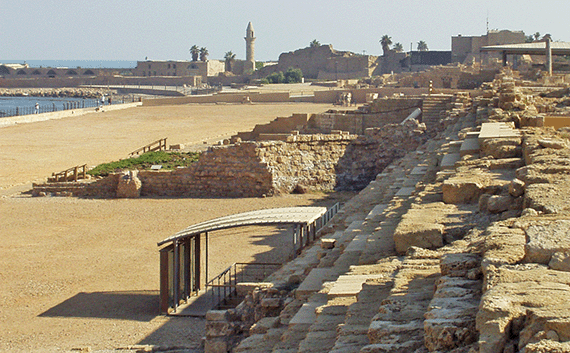 |
|
Photo:
Gila Yudkin |
|
Seats of the 2.000-year-old
hippodrome (chariot stadium) at Caesarea |
| |
|
Copyright 2005,
2020
Gila Yudkin. Permission needed for any reuse. |
| |
Coming to
Jerusalem this year? Walk the Temple Mount with Abraham and
Isaac, David and Solomon, Jesus and the
disciples, Mohammed and the angel Gabriel
with
Gila's
Temple Mount audio tour on a
CD.
Gila's Temple Mount tour
is now also available as a written
24-page PDF with a
Temple Mount plan,
guidelines for passing the security check
and ten recommended reads on the
Temple Mount from Gila's bookshelves.
|
|
Read about the
balsam of En Gedi,
a popular antidote to snake bites in
Cleopatra's day. It may have been the
medicinal Balm of Gilead which healed the
body and the soul.... |
| |
|
More on
women of the Bible: |
| |
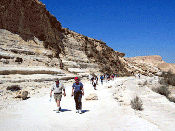 |
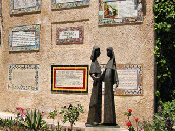 |
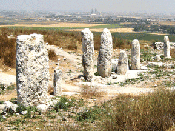 |
|
Sarah in the Negev |
Mary meets Elizabeth |
Pharaoh's daughter |
|
|
|
|
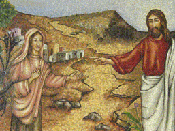 |
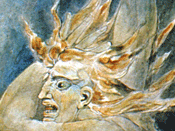 |
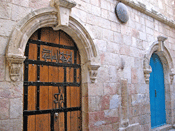 |
|
Mary Magdalene |
Witch of En Dor |
Veronica |
| |
|
Do you know the story of the
wise woman at Beth Maacah
who ended a revolt in the time of David? |
|
|
|
|
|
GILA
YUDKIN
•
TCHERNIKOVSKI
64A
•
JERUSALEM
•
ISRAEL
gila@itsgila.com
HOME
•
BOOK
GILA
•
HOLY
LAND
HEROINES •
ABOUT GILA
|
|

